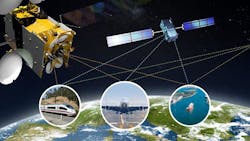Airbus' EGNOS V3 satellite-based augmentation system achieves system CDR
TAUFKIRCHEN, Germany - Airbus has successfully achieved the System Critical Design Review (CDR) on the European Geostationary Navigation Overlay Service (EGNOS) V3 satellite-based augmentation system. The EGNOS V3 is designed to add security features for the most safety-critical applications such as aircraft navigation and landing, and will provide entirely new services for maritime and land users. EGNOS V3 is the second generation of the overlay system and will improve the performance of GPS and Galileo.
The new V3 generation of EGNOS being developed by Airbus will introduce new services based on multiple frequencies of multiple constellations (GPS, Galileo), and will embed sophisticated security protection against cyber-attacks. The System CDR covers the functional design, external interfaces, operations, security, integration verification, qualification and deployment.
EGNOS V3 relies on three operations centers and 44 monitoring stations across Europe and elsewhere. It monitors the signals from satellite navigation systems and generates augmentation messages, broadcast to all users using transponders on geostationary satellites. In early 2018 Airbus was awarded the prime contract for the EGNOS V3 Implementation Phase by ESA on behalf of the European Union Agency for the Space Program.
Airbus is currently building the next generation of Galileo satellites which will improve the accuracy of the system as well as resilience of its signal, which will be key for the upcoming digital decade. They will provide new capabilities such as digitally configurable antennas, inter-satellite links, new atomic clock technologies and fully electric propulsion systems. The new spacecraft will also be more flexible and reconfigurable in orbit to satisfy the expected evolution in end-user needs.
EGNOS is a component of the European Union Space Program and is managed in the frame of the partnership agreement established between the European Commission’s Directorate-General for Defense, Industry and Space (DG-DEFIS), the European Union Agency for the Space Program (EUSPA) and the European Space Agency (ESA).
